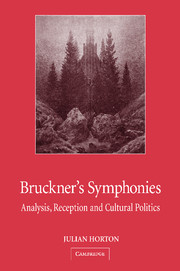Book contents
- Frontmatter
- Dedication
- Contents
- Preface
- 1 Introduction: the critical problem
- 2 Bruckner and late nineteenth-century Vienna: analysis and historical context
- 3 Right-wing cultural politics and the Nazi appropriation of Bruckner
- 4 Bruckner and musical analysis
- 5 Bruckner and the construction of musical influence
- 6 Analysis and the problem of the editions
- 7 Psychobiography and analysis
- 8 Epilogue: Bruckner and his contexts
- Bibliography
- Index
2 - Bruckner and late nineteenth-century Vienna: analysis and historical context
Published online by Cambridge University Press: 22 September 2009
- Frontmatter
- Dedication
- Contents
- Preface
- 1 Introduction: the critical problem
- 2 Bruckner and late nineteenth-century Vienna: analysis and historical context
- 3 Right-wing cultural politics and the Nazi appropriation of Bruckner
- 4 Bruckner and musical analysis
- 5 Bruckner and the construction of musical influence
- 6 Analysis and the problem of the editions
- 7 Psychobiography and analysis
- 8 Epilogue: Bruckner and his contexts
- Bibliography
- Index
Summary
Attempts to place Bruckner's symphonies in a historical context have focused especially on three areas of enquiry: the role of the symphonies in the cultural politics of late nineteenth-century Vienna; the relationship of the music to the composer's background and education; the programmatic content of the works as it was construed by Bruckner and his contemporaries. The first of these fields has been most prominent in recent research, motivated in part by renewed musicological interest in ideological and political issues.
Conceptions of the symphonies in the context of their political climate are generally based on an equation of politics, compositional influence and broad definitions of the music's character. They relate Bruckner's absorption of Wagnerian stylistic features, and the evident monumentality of the symphonies, to a complex of corresponding cultural and political factors. By these terms, reading the music in a historically sensitive manner involves disentangling it from ‘the crust of latter-day reception’, as Benjamin Korstvedt has put it, which has obscured the political resonances of Bruckner's Wagnerian affiliations and the function of the monumental symphony as an artistic symbol of the right-wing, nationalist politics that gained ground in Vienna in the 1890s. Whatever Bruckner's personal involvement with these movements, the ideological ramifications of the Brahms–Bruckner debate, as represented by the rhetoric of Hanslick on the one hand and of Göllerich, Stolzing and the Schalk brothers on the other, form the ideological basis for a historicist reading. Bruckner's engagement with Wagner is crucial in this respect.
- Type
- Chapter
- Information
- Bruckner's SymphoniesAnalysis, Reception and Cultural Politics, pp. 26 - 63Publisher: Cambridge University PressPrint publication year: 2004



